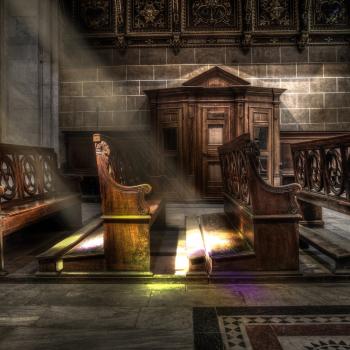
A friend of mine recently wrapped up a six-month online social experiment on ministry and gender. Since I’m very interested in how gender biases can impact who we do and don’t listen to, I’m so thankful she agreed to let me interview her. She and I have found homes in different Christian traditions, but her experiment gives all of us plenty to think about.
Reverend Melissa Fain is an ordained Disciples of Christ minister. She has a BA in Music from Kennesaw State University and a Masters of Divinity from Candler School of Theology at Emory University. She is currently the minister of Fig Tree Christian Church, an online congregation within the Disciples of Christ denomination. Prior to that, she was on camp staff at Christmount Christian Assembly and held multiple church positions in the Georgia region along with a senior minister position in Kentucky. The bottom line here is she’s an experienced and well-educated minister, which was important for this experiment.
Rev. Fain focuses on ministering to all of us lost sheep who hang out on the internet because we don’t feel welcome inside traditional churches. I say “us lost sheep” because I was one of them. I wouldn’t be here in the Catholic church (or any church at all) if I hadn’t run into her several years ago.
Ministering online as a woman presents challenges. Rev. Fain decided to conduct an experiment to see if she was treated differently as a female minister, so she created an alternate male-sounding username on Reddit and began posting as both RevMelissa (her original username, assumed to be female) and PastorJerome (assumed to be male.)
Here is Rev. Fain’s post, explaining her experiment.
Here is an AMA (Ask Me Anything) post she conducted on Reddit at the close of the experiment.
Now that you’re caught up on the basics of this experiment, let’s hear from Rev. Fain:
Kristy: How long have you been part of the Christian communities on Reddit?
Rev. Fain: The early life of Fig Tree was basically a collection of meditations written by me and guest writers. I had asked a colleague to write a guest meditation five and half years ago, and he posted it to Reddit. I noticed right away the uptick of views from the site. I quickly did what many try to do. I created an account and posted something to the sub /r/Christianity. Almost immediately, I got a message from one of the moderators asking me to do more than just post my own content.
I complied and began to learn about the woundedness of those who come online. It hurt my soul as I would hear stories of deep separation from the church. I could relate and connect. It really became less about what I was saying on Fig Tree, and more about how I was relating to others. I was also deeply troubled by the behavior of some who claimed ministerial standing online. They would openly profess to be clergy, then say things they would never say in the church.
Kristy: Speaking of people claiming to be ministers online, how often are your credentials questioned as RevMelissa?
Rev. Fain: I’ve come to realize my credentials are questioned or dismissed all the time as RevMelissa and as Melissa in real life. I think it’s difficult to believe someone who isn’t working fulltime in a church is somehow ordained and has a Masters in Divinity. But, when it comes down to it, I have no idea how many don’t believe me in real life, because so few of them question it to my face. I can see when I’m dismissed. It happens when people know I’m a minister, and they ask the guy next to him to give the prayer. It happens when there are guys who publicly make a “playful” jab at an honest mistake. (That specific one my husband brought to my attention. He flat out told me issues like that wouldn’t happen if I were male, and he’s right. Honest mistakes are ignored when a male minister makes them, while it’s ammunition against female ministers.)
It happens online when I write out a thoughtful and pastoral response, and a non-ordained male responds right after me, and gets the credit for answering the question. I think in real life, people are ashamed to question someone who says they are something, but online there is no shame. Having my credentials questioned is not only common place, it’s a way to subvert the conversation. I could be discussing something as non-threating as prayer, and get a response along the lines of “What gives you the right to call yourself a minister, “Rev”Melissa?”
When my training is questioned, my verification is called into question. “You could have made an entire website and falsified the information.” I used to think those comments were great opportunities to learn about women in ministry. I’ve since learned they are actually great opportunities to openly discuss how those comments subvert the discussion. Calling out the method over their actual words is helpful for those who are seeing those words.
More than this, I’m questioned in other areas. During this project, I answered a question about music and mentioned I had a music degree. It was followed up with a user proclaiming that I must be wrong because this user was a music student and never heard of what I was telling him or her. I came back with clarification and the user backed down.
Kristy: Did anyone ask PastorJerome for his credentials? Did anyone ask what sort of degree or training he had?
Rev. Fain: I had one person, who didn’t like what I was saying as PastorJerome and responded, “If you really are a pastor.” That’s as deep as the questioning went. No one asked for my credentials as Jerome. No one wondered where I went to school or who ordained me. People thanked me as a pastor, without any knowledge of who was writing to them.
When users were absolutely sure I was not called to be a minister as RevMelissa, I considered what PastorJerome would mean. I figured if the reactions were similar, and they questioned PastorJerome in the same way they questioned RevMelissa, it would be a validation of their remarks. It wouldn’t matter if I were male or female.
I didn’t think that would be the case, but I also didn’t think it would be so easy to be validated. It helped me understand why the male users and people in real life were so protective when I’d ask about their credentials. I discovered it was because I was the only one asking for them. Asking for verification of their education and where they were ordained was seen as an attack on their call. To them I was asking, “I don’t believe you were called, prove it.” In reality, I just wanted to know the theological background of the person I was talking to. It is not wrong to ask for credentials, and we should.
Kristy: Did you post similar comments on the same post under both the RevMelissa and PastorJerome usernames? If so, what were the results?
Rev. Fain: Yes, I made a point on several occasions to answer one post with both usernames. I almost always found the PastorJerome name garnered more karma [Reddit users receive karma points when other users vote for their comments] for almost the exact same answer. There was an exception, where the RevMelissa name received more karma. In that situation, a male minister came in to respond that I had the correct answer. After his response, the karma on that comment went up.
Kristy: Your usual username (RevMelissa) marks you as both a Reverend and a woman. When you first set up your account, did you consider using a gender neutral username?
Rev. Fain: I knew, when I created my username, I could hide either my vocation or my gender. I also knew I was called to be a minister, and God called me as a woman born and raised. Like some clergy wear collars “off work,” I wanted my username to be my ministerial collar, so to speak. There was never any question about choosing a username that showed my femininity and my calling as a minister. I did want the username /u/PastorMelissa. It was already taken, and there is a well-known Pastor Melissa out there. Just as a side note, my sister thought I should have made a PastorRussell alt for the six month study, as that would have been a factual name. Russell is my maiden name. Actually, I chose Jerome because I wanted to take this journey with a desert father, and Jerome was a good one.
Kristy: I’m interested in how theological discussions unfolded during this experiment. I’ve witnessed many discussions you’ve been involved in under your RevMelissa username. You have a seminary degree, but have often been dismissed by men who have no theological training at all. What was your experience in these types of discussions under the PastorJerome username? Were your contributions accepted as coming from an educated source or were they dismissed about as often as your contributions as RevMelissa?
Rev. Fain: PastorJerome was immediately accepted as a pastoral source. People would answer with the name “Pastor Jerome.” This accepted that this specific username was not only my real name, but I was pastoral. Some just said, “Thank you, Pastor.” The users also followed up with clarifying questions. They were trying to learn from me.
RevMelissa was either ignored or asked dismantling questions. There was this natural assumption I must be wrong somewhere, so they needed to find out where. My sister, who is also an ordained minister, looked at the IAMA [Ask Me Anything post on Reddit]. She noticed there were key points I jumped out of comment chains. I learned early on that conversation is different than accusation. There were tons of accusations going on in the IAMA. I had females behind the scenes lament a male minister didn’t do this with me, because (without me saying anything) they believed a male would have been treated with more respect.
I guess the easiest way to explain the difference is this: People asked PastorJerome questions to build up their belief. People asked RevMelissa questions to tear down my words.
Kristy: We’ve had conversations about pastoral qualifications before. I came out of a background where a man might just pick up a Bible and call himself a pastor. What dangers are associated with allowing someone to just up and start preaching and leading without any education or mentorship?
Rev. Fain: I’m from the Campbell-Stone tradition. Alexander Campbell was one of the founders and wrote his own theology called, The Christian System. It was never required for me to read it. Our denomination is very congregationally based. I chose to read it to understand the methodology for this movement I call home. Campbell thought education was extremely important for the reason that we all have a relationship with God, but none of us have a complete relationship. Understanding how others connected to God helps us have a clearer picture. It expands our view of God and helps others expand on that view as well.
That’s the good side of having an educated minister. The dangerous side is a form of snake handling. I believe untrained ministers is partly the result of attempting to create a conduit. We pick these males, and we decide that person is going to be the lightning rod for God’s message. We will hear God through him. In those situations it has little to do with educational background, and has more to do with how well the person is tapping into that God juice. Only, when we put our leadership qualities on that shaky a foundation, we end up with David Coresh or Jim Jones. That’s the worst case scenario. We don’t consider how a minister with bad theology and/or education can deeply wound the souls around him.
I compare this to a doctor. No one wants a doctor who claims to be a doctor but has absolutely no practical training. Schooling gives necessary skills to understanding what is happening to a person, and how to properly help him or her. This is true spiritually too. There is more going on in seminary and the ordination process than just knowing the physical words in a Bible. There is more going on than the contextual understanding of said words. Ethics, social context, and historical context also happen, and they are vital tools to pastoring.
Kristy: In the Catholic church, I’m not going to run across a priest who just picked up a Bible one day and decided he should lead everyone. But I do run into a large number of “armchair theologians” in all the Christian traditions I come into contact with. In my experience, these theology hobbyists are almost always men and I’m consistently surprised by how big of a following some of them get. I love that people are into theology and want to talk about it, but do you see some danger in teaching theology without having dedicated some serious time and resources to educating yourself first? Do you think your experiment could shed some light on why there is such a gender imbalance?
Rev. Fain: Going back the doctor analogy: Just like you wouldn’t want an uneducated doctor, you also wouldn’t want to go to someone who just looked up the information and gave you their opinion. Schooling shows understanding. If someone has a degree in something, it means they not only read the included texts, but showed a scholar they understood what was read. Meanwhile, playing Jerome for six months showed me we are not checking our male ministers to see if they have been tested or if they are just winging it. You asked about the gender imbalance and that’s why. Women are immediately questioned for validation and reasoning to an absurd degree. Marilyn Vos Savant had a weekly article in Parade Magazine in 1990. She was and is a very intelligent woman. When I say she’s a smart woman, she was listed as having the highest IQ in the Guinness Book of World Records. Someone asked Savant a question that has since become famous.
The question was: “Suppose you’re on a game show, and you’re given the choice of three doors: Behind one door is a car; behind the others, goats. You pick a door, say No. 1, and the host, who knows what’s behind the doors, opens another door, say No. 3, which has a goat. He then says to you, “Do you want to pick door No. 2?” Is it to your advantage to switch your choice?”
Using basic statistics, she answered that switching doors had a higher rate of choosing the winner. This is because when the contestant first chose a door they had a one in three chance to be right. That remained true even when one door was eliminated. The other door, however, became a one and two chance once the option became available. Statistically a 1/2 chance is always the better bet than the 1/3 chance.
The readers went crazy. About 10,000 people wrote in to explain how wrong she was. Only, she wasn’t wrong. The reason this is an important example is because two very smart men came up with the exact same conclusion just a few years before, and no one questioned them.
The reason this experiment shed a light on gender imbalance is because of this issue. As a society we are naturally inclined to dismiss females, whether they are right or wrong, and accept males without question. That’s called systemic sexism.
Kristy: This is a Catholic blog, so I’m interested in how this experiment might connect to the issue of clericalism. In your post, and in your AMA, you mentioned the high level of trust users placed in PastorJerome as opposed to RevMelissa. As both users were actually you, that trust wasn’t based on differing levels of intelligence or even how spiritual you were. It was based on the assumption you were a man and the assumption you were who you claimed to be—a pastor in good standing. When we place so much automatic trust in another person, that can open the door to all sorts of abuses. Can you give some examples of issues you think could arise from Christians being overly trusting of clergy who haven’t yet proven themselves to be trustworthy?
Rev. Fain: Unearned trust in any field is dangerous. Our natural inclination is to seek out field tested individuals. We know the risks of leaving our goods with a person who is not certified. We understand that picking the cheapest plumber to fix our pipes might not be the best idea. Or choosing the guy down the road to fix our car. Meanwhile, we throw our whole spiritual life into a person who “feels right.” We don’t consider the ramifications of throwing our trust into a person who is leading our spiritual lives. That person might look legit at first, but they could be leading the congregation in a direction that will hurt the congregants and/or the people connected to the congregation. That’s all innocent and silly if that wrong direction leads a congregation to all wear something or do something different with their hair. It’s serious when unproven leadership leads a congregation to do something that leads to death.
I necessarily need to add: Just because your minister isn’t taking you to a foreign jungle, and making you drink cyanide laced flavor-aid, doesn’t mean your minister isn’t killing something. Death comes in many forms. A person might be comfortable in his or her pew, while the recommendations of their pastor will hurt the family around that congregant. It is always okay to ask a human being, “Why did you act or say that thing?” In asking this you might get a deeper context or discover one shouldn’t listen to what is being said.
Kristy: In your post, you mentioned one of your findings is that “everyone is male on the internet.” When you and I first connected on Reddit, I had an obviously female username as well, but other users repeatedly referred to me as “he.” Can you share what sort of impact is has on women when male is the default in a Christian setting?
Rev. Fain: I had no idea how much I wanted to read someone write about RevMelissa in the third person feminine. During the experiment a male ministerial user stepped in to tell another user what I was saying was correct. Even then, the user said “That is correct,” not “She’s correct.” When the one and only person gave RevMelissa a gender, she knew me as a person.
I think refusing to accept femininity in Christian circles dehumanizes female Christians. It keeps or takes away power from a feminine voice or actions. It also allows a Christian setting to embrace social masculinity, which is not actual masculinity, but the societal understanding of masculinity.
Kristy: We don’t have female priests within the Catholic church, but there are opportunities for women to lead and teach, assuming people are willing to listen and learn. What advice do you have for women who are following their call from God to lead and teach, despite having a more difficult time being taken seriously?
Rev. Fain: We’ve already learned that separate but equal can’t exist. During the civil rights movement, they tried it. They learned it takes too much money and time to figure out how to make institutions and places where equal money and time is going to both. Something must give. Whatever is considered more socially good is given the most attention and money. Women have socially been called separate but equal since before the civil rights movement, and while it is separate, it’s not equal.
If you are female and want to follow God’s call here is the bitter truth: Seminaries are seeing a rise of female seminarians. My class at Candler was the first to see slightly more females graduating than men. They championed that as a change for the better. However, in my denomination, 20% won’t even be ordained. Of those who are ordained, around 65% won’t even be the senior minister. Many are simply avoiding the institutional church all together. I don’t know how that “equality” plays out in the Catholic Church, but in the Disciples of Christ, it’s anything but equal.
Kristy: What advice do you have for men who believe it’s important to include women and want to help promote women’s voices within the church?
Rev. Fain: This whole thing began over a year ago when I first had the idea to do it. I spent about half a year searching for male ministers who were willing to do the experiment from the other side. While they all showed interest, and verbal support, none were willing to physically give me a few minutes a day to do this with me.
This is just true in life. I can name a plethora of male ministers who have verbally told me I’m doing great things. We are to the point where we need some action with those words. The world is changed by the powerful giving away power. It was true when the white ministers walked with Martin Luther King Jr in Selma. It was true when white African college students stood against Apartheid. It will be true when male ministers act for female ministers.
Females already have a voice in the church, they are just voiced by men. The lessons of our mothers and teachers echo through us every time we speak or act. We need to be cognizant that they have been educating us from the beginning.
Kristy: Thank you so much for taking the time to do this experiment and this interview. We need to take a hard look at the biases we carry into our interactions with others.












